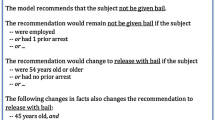Abstract
In the past decade, we have witnessed the widespread adoption of Deep Neural Networks (DNNs) in several Machine Learning tasks. However, in many critical domains, such as healthcare, finance, or law enforcement, transparency is crucial. In particular, the lack of ability to conform with prior knowledge greatly affects the trustworthiness of predictive models. This paper contributes to the trustworthiness of DNNs by promoting monotonicity. We develop a multi-layer learning architecture that handles a subset of features in a dataset that, according to prior knowledge, have a monotonic relation with the response variable. We use two alternative approaches: (i) imposing constraints on the model’s parameters, and (ii) applying an additional component to the loss function that penalises non-monotonic gradients. Our method is evaluated on classification and regression tasks using two datasets. Our model is able to conform to known monotonic relations, improving trustworthiness in decision making, while simultaneously maintaining small and controllable degradation in predictive ability.
Access this chapter
Tax calculation will be finalised at checkout
Purchases are for personal use only
Similar content being viewed by others
Notes
- 1.
- 2.
- 3.
In most real-world problems, including the ones illustrated in this paper, domain expertise is essential to distinguish between true and spurious monotonic relations.
References
Archer, N.P., Wang, S.: Application of the back propagation neural network algorithm with monotonicity constraints for two-group classification problems. Decis. Sci. 24(1), 60–75 (1993)
Bartolj, T.: Testing monotonicity of variables. Master’s thesis, Faculty of Economics and Business Administration, Tilburg University (2010)
Cano, J.R., Gutiérrez, P.A., Krawczyk, B., Woźniak, M., García, S.: Monotonic classification: an overview on algorithms, performance measures and data sets. Neurocomputing 341, 168–182 (2019)
Carvalho, D.V., Pereira, E.M., Cardoso, J.S.: Machine learning interpretability: a survey on methods and metrics. Electronics 8(8), 832 (2019)
Daniels, H., Velikova, M.: Monotone and partially monotone neural networks. IEEE Trans. Neural Netw. 21(6), 906–917 (2010)
Gupta, A., Shukla, N., Marla, L., Kolbeinsson, A., Yellepeddi, K.: How to incorporate monotonicity in deep networks while preserving flexibility? arXiv preprint arXiv:1909.10662 (2019)
Lipton, Z.C.: The mythos of model interpretability: in machine learning, the concept of interpretability is both important and slippery. Queue 16(3), 31–57 (2018)
Márquez-Neila, P., Salzmann, M., Fua, P.: Imposing hard constraints on deep networks: promises and limitations. arXiv preprint arXiv:1706.02025 (2017)
Nguyen, A.P., Martínez, M.R.: Mononet: towards interpretable models by learning monotonic features. arXiv preprint arXiv:1909.13611 (2019)
Pathak, D., Krahenbuhl, P., Darrell, T.: Constrained convolutional neural networks for weakly supervised segmentation. In: Proceedings of the IEEE International Conference on Computer Vision, pp. 1796–1804 (2015)
Rudin, C.: Stop explaining black box machine learning models for high stakes decisions and use interpretable models instead. Nature Mach. Intell. 1(5), 206–215 (2019)
Sill, J.: Monotonic networks. Adv. Neural Inf. Process. Syst. 10, 661–667 (1997)
Silva, W., Fernandes, K., Cardoso, M.J., Cardoso, J.S.: Towards complementary explanations using deep neural networks. In: Stoyanov, D., et al. (eds.) MLCN/DLF/IMIMIC -2018. LNCS, vol. 11038, pp. 133–140. Springer, Cham (2018). https://doi.org/10.1007/978-3-030-02628-8_15
Toreini, E., Aitken, M., Coopamootoo, K., Elliott, K., Zelaya, C.G., van Moorsel, A.: The relationship between trust in AI and trustworthy machine learning technologies. In: Proceedings of the 2020 Conference on Fairness, Accountability, and Transparency, pp. 272–283 (2020)
You, S., Ding, D., Canini, K., Pfeifer, J., Gupta, M.: Deep lattice networks and partial monotonic functions. In: Advances in Neural Information Processing Systems, pp. 2981–2989 (2017)
Zhu, H., Tsang, E.C., Wang, X.Z., Ashfaq, R.A.R.: Monotonic classification extreme learning machine. Neurocomputing 225, 205–213 (2017)
Acknowledgements
This work is partially developed within project AIDA - Adaptive, Intelligent and Distributed Assurance Platform (reference POCI-01-0247-FEDER-045907) co-financed by the ERDF - European Regional Development Fund through the Operational Programme for Competitiveness and Internationalisation – COMPETE 2020 and by the Portuguese Foundation for Science and Technology – FCT, under CMU Portugal.
Author information
Authors and Affiliations
Editor information
Editors and Affiliations
Rights and permissions
Copyright information
© 2021 Springer Nature Switzerland AG
About this paper
Cite this paper
Trindade, J., Vinagre, J., Fernandes, K., Paiva, N., Jorge, A. (2021). Partially Monotonic Learning for Neural Networks. In: Abreu, P.H., Rodrigues, P.P., Fernández, A., Gama, J. (eds) Advances in Intelligent Data Analysis XIX. IDA 2021. Lecture Notes in Computer Science(), vol 12695. Springer, Cham. https://doi.org/10.1007/978-3-030-74251-5_2
Download citation
DOI: https://doi.org/10.1007/978-3-030-74251-5_2
Published:
Publisher Name: Springer, Cham
Print ISBN: 978-3-030-74250-8
Online ISBN: 978-3-030-74251-5
eBook Packages: Computer ScienceComputer Science (R0)




